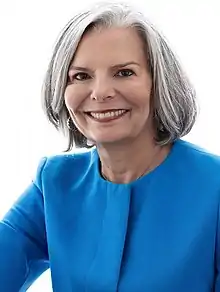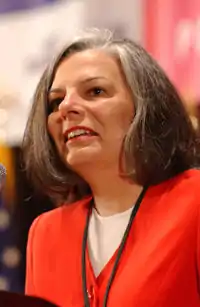Julie Gerberding
Julie Louise Gerberding (born August 22, 1955) is an American infectious disease expert who was the first woman to serve as the director of the U.S. Centers for Disease Control and Prevention (CDC). As of May 2022, she is the CEO of the Foundation for the National Institutes of Health (FNIH). Gerberding grew up in Estelline, South Dakota, attended Brookings High School, and earned undergraduate and graduate degrees from Case Western Reserve University. She was the chief medical resident at the University of California, San Francisco where she treated hospitalized AIDS patients in the first years of the epidemic. Gerberding became a nationally-recognized figure during the 2001 anthrax attacks in the United States during her tenure as the acting deputy director of the National Center for Infectious Diseases, where she was a prominent spokeswoman for the CDC during daily briefings regarding the attacks and aftermath. Gerberding then served as CDC director from 2002-2009, and was then hired as an administrator at Merck.
Julie Gerberding | |
|---|---|
 | |
| 15th Director of the Centers for Disease Control and Prevention | |
| In office July 3, 2002 – January 20, 2009 | |
| President | George W. Bush |
| Preceded by | Jeffrey Koplan |
| Succeeded by | Tom Frieden |
| Personal details | |
| Born | August 22, 1955 Estelline, South Dakota, U.S. |
| Education | Case Western Reserve University (BA, MD) University of California, Berkeley (MPH) |
| Occupation | Chief Executive Officer for the Foundation for the National Institutes of Health |
Education and early career
Gerberding grew up in Estelline, South Dakota[1] and attended Brookings High School[2] and Case Western Reserve University, where she earned an undergraduate degree in biology in 1977 and an M.D. in 1981.[3] She completed her internship and was the chief medical resident at the University of California San Francisco, where she also completed a fellowship in clinical pharmacology and infectious diseases. Gerberding was an assistant professor at UCSF from 1988-1995 and the director of the Epidemiology and Prevention Interventions Center at San Francisco General Hospital from 1990-1998.[2] She also earned an M.P.H. degree from the University of California Berkeley in 1990 [4] and was an associate clinical professor of medicine (infectious diseases) at Emory University.[5]
AIDS research
During her medical residency at San Francisco General Hospital, Gerberding treated some of the first hospitalized AIDS patients.[6] She completed several studies on the risks of HIV to healthcare workers, created guidelines to prevent their infections, and established a treatment and research unit focused on HIV/AIDS cases among the urban poor.[7][8]
US CDC
In 1998, Gerberding was hired by the United States Centers for Disease Control and Prevention as the Director of the Division of Healthcare Quality Promotion. There, she "developed CDC's patient safety initiatives and other programs to prevent infections, antimicrobial resistance and medical errors in healthcare settings." [9]
In September 2001, she became the acting deputy director of the National Center for Infectious Diseases (NCID). During the 2001 anthrax attacks, Gerberding was part of a CDC team who regularly communicated with Congress, briefed the United States Health and Human Services senior staff, and communicated with the public about the crisis via daily press conferences.[8][10]
In April 2002, after the resignation of CDC Director Jeffrey Koplan, Gerberding became the acting principal deputy director of the CDC and deputy director of the NCID.
CDC director

In July 2002, Secretary of Health and Human Services Tommy Thompson named Gerberding as the director of the CDC and administrator for the Agency for Toxic Substances and Disease Registry (ATSDR).[4]
In May 2004, the CDC announced a significant restructuring to improve its preparedness for several types of threats, to promote health, and to better prevent disease, injury and disability.[11][12] The reorganization was controversial, and Gerberding received bipartisan criticism from individuals and occupational health & safety groups, mainly centered around the implications of the restructuring for the National Institute for Occupational Safety and Health.[13]
Other challenges of Gerberding's tenure as CDC Director included the American response to the global outbreak of Severe acute respiratory syndrome (SARS)[6] and to several natural disasters, including Hurricane Katrina.
Gerberding resigned as CDC director effective on January 20, 2009, Barack Obama's inauguration day, to enable Obama's appointment for CDC director, Tom Frieden, to assume his position.[14][15]
Private sector
In December 2009, Gerberding became president of Merck's vaccine division.[16][17][18] In December 2014, the company announced her appointment as executive vice president for strategic communications, global public policy and population health. In March 2022 it was announced that she would be retiring from Merck in May in order to assume the role as CEO of the Foundation for the National Institutes of Health (FNIH).[19][20][18]
In April 2021, Gerberding told a Michigan news outlet that the United States' response to the COVID-19 pandemic was inadequate and that herd immunity to the virus would be challenging to achieve due to widespread vaccine hesitancy.[21]
On May 30, 2021, Gerberding delivered the commencement address to the Washington University in St. Louis Class of 2020, whose commencement ceremonies were postponed until May 2021 due to the pandemic.[22][23]
Memberships
- National Academy of Medicine[24]
- Infectious Diseases Society of America[25]
- American Society for Clinical Investigation[26]
- American College of Physicians[27][9]
- National Academy of Public Administration[28]
- Center for Health Incentives and Behavioral Economics[29]
- Global Leaders Group on Antimicrobial Resistance[30]
Honors
- 2005 Time “100 Most Influential People in the World"
- Forbes “100 Most Powerful Women in the World” 2005-2008,[31]
- 2012 Distinguished Alumnus Award, Case Western Reserve University[3]
- Honorary Doctor of Science, Mercer University[32]
- Surgeon General's Medallion[31]
- U.S. Department of Health and Human Services (DHHS) distinguished service award[27]
- Healthcare Businesswomen Association's Woman of the Year 2018[33]
References
- Crisler, Dan. "Former CDC Director Gerberding keeps in touch with Estelline roots". Aberdeen News. Archived from the original on 30 December 2020. Retrieved 30 December 2020.
- "How Did I Get Here? Julie Gerberding". Bloomberg. Archived from the original on 30 December 2020. Retrieved 30 December 2020.
- "Julie Gerberding, MD, (WRC '77, MED '81) 2012 Distinguished Alumnus Award". Case Western Reserve University. 18 September 2017. Archived from the original on 30 December 2020. Retrieved 30 December 2020.
- "Julie Gerberding, MD, MPH, Named CDC Director and ATSDR Administrator". CDC.gov. Archived from the original on 30 December 2020. Retrieved 30 December 2020.
- "The Mary Lynn Morgan Annual Lecture on Women and Health". Emory University. Archived from the original on 30 December 2020. Retrieved 30 December 2020.
- Weintraub, Karen (5 June 2021). "It's been 40 years since the first reported cases of AIDS. While treatments have come a long way, a vaccine remains elusive". USA Today. Archived from the original on 6 June 2021. Retrieved 6 June 2021.
- Roos, Robert. "Julie Gerberding named director of CDC". University of Minnesota Center for Infectious Disease Research and Policy. Archived from the original on 30 December 2020. Retrieved 30 December 2020.
- McKenna, M.A.J. "Infectious disease expert to lead CDC". UCLA Department of Epidemiology/School of Public Health. The Atlanta Journal-Constitution. Archived from the original on 30 December 2020. Retrieved 30 December 2020.
- "Julie L. Gerberding, MD, MPH Director, CDC; Administrator, ATSDR". The White House: President George W. Bush. Archived from the original on 29 December 2020. Retrieved 29 December 2020.
- Stobbe, Mike (11 January 2009). "CDC director is leaving with a mixed legacy". The San Diego Union-Tribune. Archived from the original on 30 December 2020. Retrieved 30 December 2020.
- "CDC Announces New Goals and Organizational Design". CDC. Archived from the original on 30 December 2020. Retrieved 30 December 2020.
- Roos, Robert. "Reorganization aims to boost CDC's preparedness impact". University of Minnesota Center for Infectious Disease Research and Policy. Archived from the original on 30 December 2020. Retrieved 30 December 2020.
- Weiss, Rick. "Change at CDC Draws Protest". The Washington Post. Archived from the original on 30 December 2020. Retrieved 30 December 2020.
- The Associated Press (10 January 2009). "Director of Disease Control Centers Resigns". The New York Times. Archived from the original on 30 December 2020. Retrieved 30 December 2020.
- "CDC director resigns effective January 20". CNN Health. CNN. Archived from the original on 31 July 2012. Retrieved 30 December 2020.
- "Former CDC head lands vaccine job at Merck". Reuters. 21 December 2009. Archived from the original on 30 December 2020. Retrieved 29 December 2020.
- Silberner, Joanne (21 December 2009). "Merck Hires Ex-CDC Chief Gerberding To Run Vaccines Unit". NPR. Archived from the original on 21 December 2019. Retrieved 30 December 2020.
- Lindner, Linda (3 March 2022). "Infectious disease expert, former CDC director Gerberding to retire from Merck". roi-nj.com. Archived from the original on 2 May 2022. Retrieved 2 May 2022.
- "Dr. Julie L. Gerberding to Retire from Merck". Merck. 1 March 2022. Archived from the original on 1 May 2022. Retrieved 1 May 2022.
- Kansteiner, Frasier (2 March 2022). "Merck loses another vet, this time bidding adieu to chief patient officer Gerberding". Fierce Pharma. Archived from the original on 1 May 2022. Retrieved 1 May 2022.
- Barrett, Malachi (14 April 2021). "Health officials say slow response, political influence made coronavirus pandemic worse". MLive. Archived from the original on 16 April 2021. Retrieved 16 April 2021.
- Robbins, Julia (15 April 2021). "Dr. Julie Gerberding, first woman director of CDC, to be commencement speaker for Class of 2020". Student Life: The independent newspaper of Washington University in St. Louis. Archived from the original on 16 April 2021. Retrieved 16 April 2021.
- McCarthy, Leslie Gibson (30 May 2021). "'Stride boldly through the portal of the pandemic'". The Source: Washington University in St. Lous. Archived from the original on 1 June 2021. Retrieved 1 June 2021.
- "Julie Louise Gerberding, M.D., M.P.H." National Academy of Medicine. Archived from the original on 30 December 2020. Retrieved 30 December 2020.
- "Your Colleagues: Members on the Move". Infectious Diseases Society of America. Archived from the original on 30 December 2020. Retrieved 30 December 2020.
- "Julie Louise Gerberding, MD, MPH". The American Society for Clinical Investigation. Archived from the original on 30 December 2020. Retrieved 30 December 2020.
- "Julie L. Gerberding, M.D., M.P.H." Merck. Archived from the original on 29 December 2020. Retrieved 29 December 2020.
- "Julie Gerberding". National Academy of Public Administration. Archived from the original on 30 December 2020. Retrieved 30 December 2020.
- "Julie Louise Gerberding, MD, MPH - CHIBE". Center for Health Incentives and Behavioral Economics. Retrieved 2023-03-13.
- "Members". Global Leaders Group on Antimicrobial Resistance. Archived from the original on 2 May 2022. Retrieved 2 May 2022.
- "Julie Gerberding". Harvard T.H. Chan School of Public Health. 31 October 2017. Archived from the original on 30 December 2020. Retrieved 30 December 2020.
- Fullbright, Nancy (19 May 2006). "GERBERDING RECEIVES HONORARY DOCTOR OF SCIENCE". Mercer University. Archived from the original on 30 December 2020. Retrieved 30 December 2020.
- "Dr. Julie Gerberding of Merck & Co., Inc., named 2018 Woman of the Year by the Healthcare Businesswomen's Association". Healthcare Businesswomen's Association. Archived from the original on 30 December 2020. Retrieved 30 December 2020.
External links
- Former CDC Director Breaks Down U.S. Readiness For Coronavirus, NPR's All Things Considered, January 29, 2020
- Appearances on C-SPAN